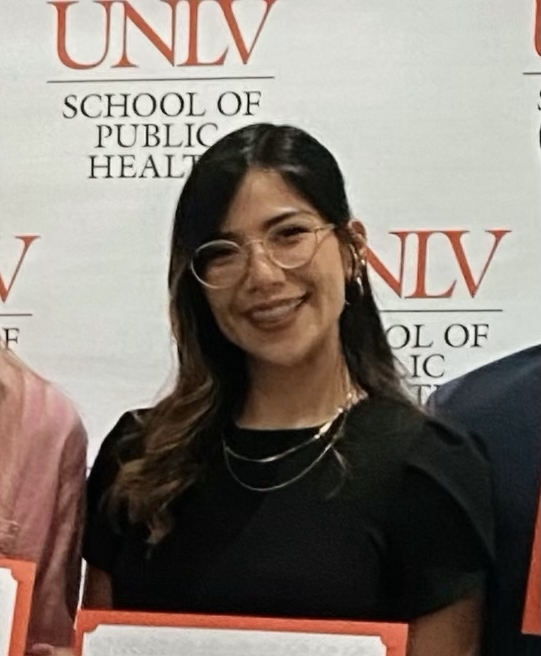About Me

Hi, I’m Karen Figueroa Chilito, a data scientist and researcher committed to understanding the dynamics of mosquito populations and the diseases they spread, such as malaria and dengue. I am currently pursuing a PhD in Global and Environmental Health at the University of Nevada, Las Vegas (UNLV) and serve as a graduate researcher in the PARAVEC Laboratory (Parasitology and Vector Biology Lab) under the guidance of Dr. Louisa Messenger.
My work integrates machine learning, geospatial analysis of high-resolution raster datasets, and genomics to explore how mosquitoes adapt to new environments, what drives their spread, and the environmental patterns that determine their survival. By developing predictive models and analyzing genetic data, I aim to inform innovative strategies to combat mosquito-borne diseases and protect vulnerable populations worldwide.
Research Interests
I explore the intersection of climate change and mosquito population dynamics, leveraging machine learning, deep learning, and satellite imagery to understand and predict the environmental factors influencing mosquito distribution and the spread of vector-borne diseases. My work focuses on modeling relationships between environmental changes (e.g., vegetation, water sources) and mosquito populations to develop innovative monitoring systems and adaptive public health strategies.
Academic Contributions
- 📚 Explore my academic work: Google Scholar Profile
- 📝 Featured Article: The Lancet Planetary Health
Advocacy Work
🌍 I was honored to represent Nevada at the 2024 United to Beat Malaria Leadership Summit in Washington, D.C., alongside my advisor, Dr. Louisa Messenger. This grassroots campaign by the United Nations Foundation brought together advocates to address the urgent need for sustained funding for malaria elimination initiatives.
As part of this summit, I met with policymakers, including:
- Senator Jacky Rosen (NV)
- Senator Catherine Cortez-Masto (NV)
- Representative Dina Titus (NV)
Dr. Messenger participated as a guest speaker in the plenary panel, sharing insights on bridging research and advocacy.
Achievements
- UNLV Graduate Mentor (2024): Became a mentor in the Graduate Mentoring Excellence, Nurturing Talents, Opportunities, and Resources for Success (MENTORS) program at UNLV in 2024. Through this program, I mentor an incoming graduate student, providing guidance on academic challenges, career planning, and building professional networks. Committed to continuing as a mentor for as long as I am at UNLV, contributing to the graduate community while developing leadership and coaching skills that enhance my growth as a public health professional. This role allows me to give back to the UNLV community and inspire the next generation of scholars.
- Mary Guinan and Shawn Gerstenberger Public Health Scholarship: Awarded for my commitment to advancing public health in Nevada, particularly in the fields of Environmental & Occupational Health and Biostatistics & Epidemiology.
- ARPA Scholarship Award: Received $1,500 in support of my experiential learning project aimed at addressing public health challenges in Nevada. Committed to fulfilling the scholarship’s stipulations, including reporting and focus group participation.
Conferences
- AMCA 91st Annual Meeting, March 2025: Scheduled to present Predicting Geographic Expansion and Genetic Adaptation of Aedes aegypti in Southern Nevada using Machine Learning Techniques. This presentation is part of the New Vector Control Tools: UAS and Artificial Intelligence session on March 6, 2025, at the Puerto Rico Convention Center.
- ASTMH (American Society of Tropical Medicine and Hygiene), November 2024: Karen presented her research, Population Genomics of an Invasive Mosquito Vector, Aedes aegypti, in Southern Nevada, at the ASTMH Annual Meeting in New Orleans. Competing in the Young Investigator Award Competition, Karen highlighted crucial insights into the genetic diversity and population dynamics of Aedes aegypti in arid environments, with significant implications for vector control strategies and public health interventions. This experience also allowed Karen to foster collaborations with global health experts and emphasize the integration of genomic data with environmental contexts in informing health strategies.
-
NeurIPS (Conference on Neural Information Processing Systems), December 2023: At NeurIPS in Vancouver, Canada, Karen participated in workshops exploring the intersection of AI and science. Key workshops included:
- Self-Supervised Learning: Theory and Practice: Karen delved into training models without labeled data, gaining insights into applying self-supervised learning to genomic sequences and geospatial imaging for environmental monitoring.
- Tackling Climate Change with Machine Learning: Focused on AI applications for addressing climate challenges, this workshop introduced Karen to tools for greenhouse gas monitoring, renewable energy forecasting, and spatio-temporal modeling. She connected with researchers to explore applications for mosquito population dynamics.
- UniReps: Unifying Representations in Neural Models: Karen explored theoretical frameworks for aligning neural model representations and identified parallels with her research in population genomics, particularly in comparing datasets across environmental contexts.
These conferences and workshops have provided invaluable opportunities for Karen to present her research, learn cutting-edge techniques, and foster collaborations with global experts, advancing her contributions to public health and machine learning.
Projects
Explore my latest projects:
- Mosquito Population Dynamics: An app analyzing climate change impacts on mosquito distribution using high-resolution satellite data.
- Mosquito-Borne Diseases Dashboard: A dashboard to track and visualize trends in mosquito-borne diseases using predictive modeling.
Portfolio
Explore my work and achievements:
GitHub PortfolioAcademic E-Portfolio
Resume
View or download my full CV below:
Contact Me
Email: k.figueroac.17@gmail.com
Email: klfch@unlv.nevada.edu
LinkedIn: Karen Figueroa